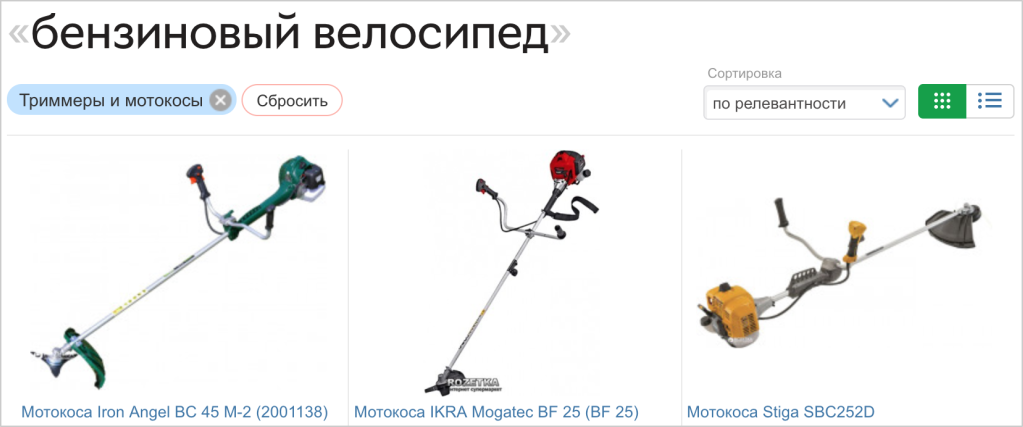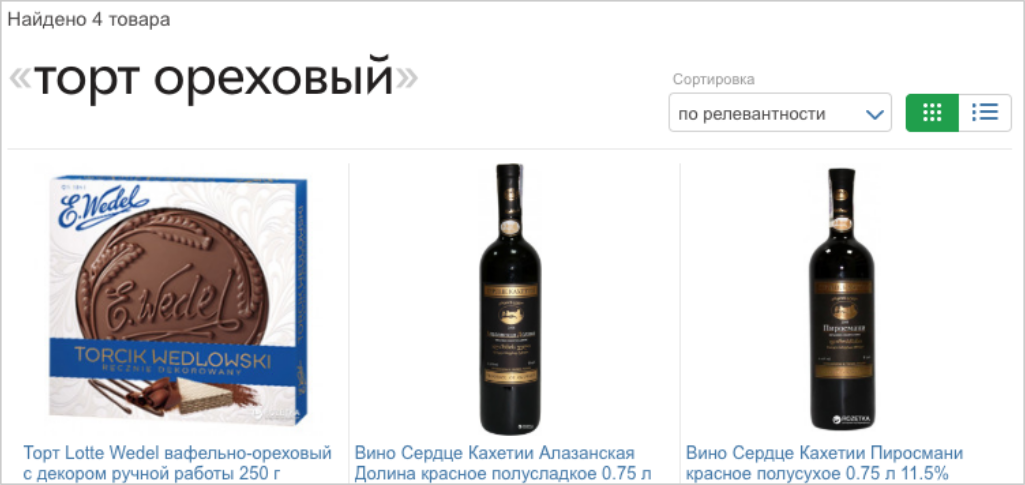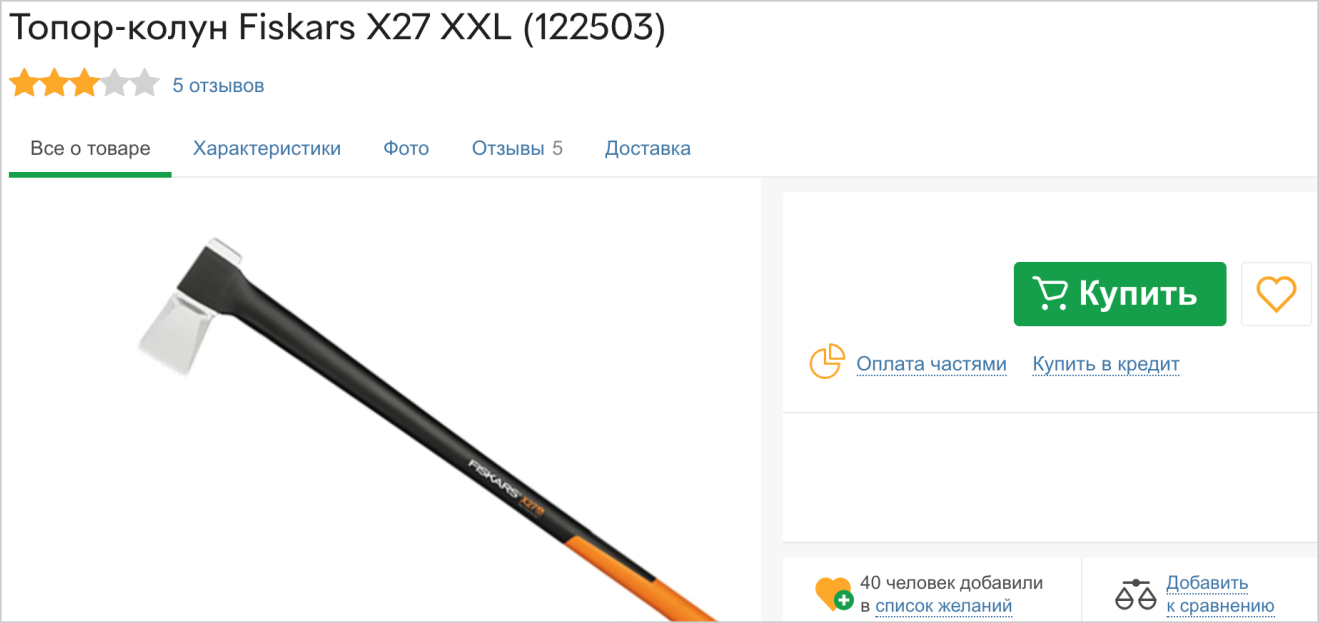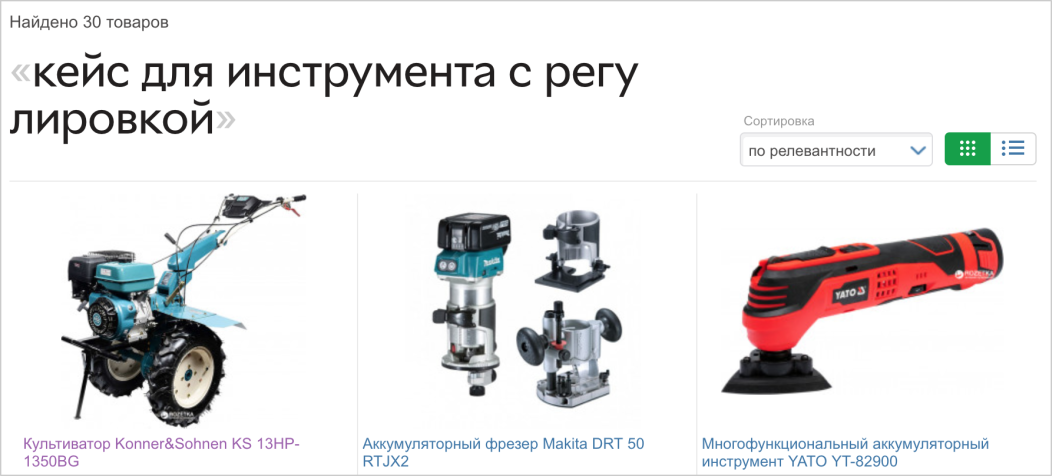Petrol bikes or weird product search (e-commerce)
Discussing the quality of grocery search and the ways of its automated testing, last time, we came to an understanding of some non-transparency of the problem. A huge number of online stores often put buyers in a dead end, not finding the required simple requests, and the problem, as it were, is not. In a word, we look at the real problems of a not very relevant search for a very popular online store (which really wants to be a “marketplace”).

The example with a bicycle illustrates a simple truth: you can not find what you need, do not show too much. In addition, it is not so difficult to select a “bicycle” as the main product required.
So, we would be sweet. There are thousands of categories, hundreds of thousands of products - we will search. What could be easier? They want a cake!
')

So, strangely, what does eco gel mean for washing? It's evening here, tea, mood ... Is there no cake? "And if I find?"

Not a great result, of course, but there’s a cake. Thus, we get a rather serious problem: there are cakes in the assortment of the store, but they cannot be found on a specific request. It would be interesting to know how many other products "disappear" from the field of view of a potential buyer.
What could be easier than finding a position on the brand name and the name of a particular model? A schoolboy, using a simple full-text search, will cope with the task in a ridiculous time, and here:

There would be a problem in the absence of a particular model or brand in general. But no, the required ax is in the catalog, it even has a share value.

Knowing the specifics of the investigated search solution, you can easily show how irrelevant the results can be seen by the buyer.

It is worth considering that many products do not have additional characteristics at all. Others, on the contrary, are replete with a mass of details that are taken into account during the search. One problem - the search does not take into account either the context or the distance between the keywords in the block. Moreover, it is very harmful so aggressively to use secondary information about the product, which is most likely checked quickly or not at all.

The author does not undertake to assess how much profit the store loses, but any system problem definitely requires a solution. Not all requests are uniquely accurate and clear. In addition, the rare buyer decides to stay and find out why he is shown outright nonsense in response to a more or less obvious request.

Excessive simplification greatly affects the result. It will be interesting to follow the evolution of the search for this online store. But the most important conclusion is very obvious - the search must be tested. By the way, the problem with "fiskars x27" was found using an automated tool. Soon freely available, do not miss.

The example with a bicycle illustrates a simple truth: you can not find what you need, do not show too much. In addition, it is not so difficult to select a “bicycle” as the main product required.
Such an interesting result was obtained because the mowers really are gasoline (as indicated by a separate field “type”), in addition, in the additional characteristics you can find “handle type: bicycle”. Similarly, work: "gasoline knife", "gasoline fishing line", etc. It is unreasonable to use background information so straightforward.
The case of the missing cake
So, we would be sweet. There are thousands of categories, hundreds of thousands of products - we will search. What could be easier? They want a cake!
')

So, strangely, what does eco gel mean for washing? It's evening here, tea, mood ... Is there no cake? "And if I find?"

Not a great result, of course, but there’s a cake. Thus, we get a rather serious problem: there are cakes in the assortment of the store, but they cannot be found on a specific request. It would be interesting to know how many other products "disappear" from the field of view of a potential buyer.
The situation, of course, strange. It seems that a small number of results for the initial query (consisting of one word) includes suspicion of the brand name and transliterated search. Any clarification of the initial request "waffle cake", "cake with decor" solves the problem.
Mood spoiled where the ax?
What could be easier than finding a position on the brand name and the name of a particular model? A schoolboy, using a simple full-text search, will cope with the task in a ridiculous time, and here:

There would be a problem in the absence of a particular model or brand in general. But no, the required ax is in the catalog, it even has a share value.

In this case, the human factor works. The person who added the position scored X27 using Cyrillic. Naturally, picking up the brand name, a potential buyer will continue to dial a specific model without switching the layout.
Fecal pump?
Knowing the specifics of the investigated search solution, you can easily show how irrelevant the results can be seen by the buyer.

It is worth considering that many products do not have additional characteristics at all. Others, on the contrary, are replete with a mass of details that are taken into account during the search. One problem - the search does not take into account either the context or the distance between the keywords in the block. Moreover, it is very harmful so aggressively to use secondary information about the product, which is most likely checked quickly or not at all.

The author does not undertake to assess how much profit the store loses, but any system problem definitely requires a solution. Not all requests are uniquely accurate and clear. In addition, the rare buyer decides to stay and find out why he is shown outright nonsense in response to a more or less obvious request.

Excessive simplification greatly affects the result. It will be interesting to follow the evolution of the search for this online store. But the most important conclusion is very obvious - the search must be tested. By the way, the problem with "fiskars x27" was found using an automated tool. Soon freely available, do not miss.
miscellanea
Source: https://habr.com/ru/post/425957/
All Articles